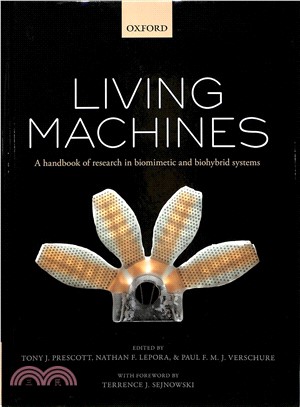Living Machines ― A Handbook of Research in Biomimetics and Biohybrid Systems
定價
:NT$ 10865 元優惠價
:90 折 9779 元
若需訂購本書,請電洽客服 02-25006600[分機130、131]。
相關商品
商品簡介
作者簡介
商品簡介
Contemporary research in the field of robotics attempts to harness the versatility and sustainability of living organisms. By exploiting those natural principles, scientists hope to render a renewable, adaptable, and robust class of technology that can facilitate self-repairing, social, and moral--even conscious--machines. This is the realm of robotics that scientists call "the living machine".
Living Machines can be divided into two entities-biomimetic systems, those that harness the principles discovered in nature and embody them in new artifacts, and biohybrid systems, which couple biological entities with synthetic ones.
Living Machines: A handbook of research in biomimetic and biohybrid systems surveys this flourishing area of research. It captures the current state of play and points to the opportunities ahead, addressing such fields as self-organization and co-operativity, biologically-inspired active materials, self-assembly and self-repair, learning, memory, control architectures and self-regulation, locomotion in air, on land or in water, perception, cognition, control, and communication. In all of these areas, the potential of biomimetics is shown through the construction of a wide range of different biomimetic devices and animal-like robots. Biohybrid systems is a relatively new field, with exciting and largely unknown potential, but one that is likely to shape the future of humanity. Chapters outline current research in areas including brain-machine interfaces-where neurons are connected to microscopic sensors and actuators-and various forms of intelligent prostheses from sensory devices like artificial retinas, to life-like artificial limbs, brain implants, and virtual reality-based rehabilitation approaches.
The handbook concludes by exploring the impact living machine technology will have on both society and the individual, by forcing human beings to question how we see and understand ourselves.
With contributions from leading researchers drawing on ideas from science, engineering, and the humanities, this handbook will appeal to both undergraduate and postgraduate students of biomimetic and biohybrid technologies. Researchers in the areas of computational modeling and engineering, including artificial intelligence, machine learning, artificial life, biorobotics, neurorobotics, and human-machine interfaces, will find Living Machines an invaluable resource.
Living Machines can be divided into two entities-biomimetic systems, those that harness the principles discovered in nature and embody them in new artifacts, and biohybrid systems, which couple biological entities with synthetic ones.
Living Machines: A handbook of research in biomimetic and biohybrid systems surveys this flourishing area of research. It captures the current state of play and points to the opportunities ahead, addressing such fields as self-organization and co-operativity, biologically-inspired active materials, self-assembly and self-repair, learning, memory, control architectures and self-regulation, locomotion in air, on land or in water, perception, cognition, control, and communication. In all of these areas, the potential of biomimetics is shown through the construction of a wide range of different biomimetic devices and animal-like robots. Biohybrid systems is a relatively new field, with exciting and largely unknown potential, but one that is likely to shape the future of humanity. Chapters outline current research in areas including brain-machine interfaces-where neurons are connected to microscopic sensors and actuators-and various forms of intelligent prostheses from sensory devices like artificial retinas, to life-like artificial limbs, brain implants, and virtual reality-based rehabilitation approaches.
The handbook concludes by exploring the impact living machine technology will have on both society and the individual, by forcing human beings to question how we see and understand ourselves.
With contributions from leading researchers drawing on ideas from science, engineering, and the humanities, this handbook will appeal to both undergraduate and postgraduate students of biomimetic and biohybrid technologies. Researchers in the areas of computational modeling and engineering, including artificial intelligence, machine learning, artificial life, biorobotics, neurorobotics, and human-machine interfaces, will find Living Machines an invaluable resource.
作者簡介
Tony J. Prescott, Professor of Cognitive Neuroscience, Sheffield Robotics, The University of Sheffield, UK,Nathan Lepora, Senior Lecturer in Engineering Mathematics, Department of Engineering Mathematics and Bristol Robotics Laboratory, University of Bristol, UK,Paul F.M.J Verschure, Research Professor and Director, Catalan Institute for Bioengineering, Spain
Tony Prescott is Professor of Cognitive Robotics at the University of Sheffield, UK, and Director of Sheffield Robotics, a cross-disciplinary research institute with over one hundred and fifty researchers (www.sheffieldrobotics.ac.uk). His background mixes psychology, neuroethology, and brain theory with robotics and artificial intelligence, and his research aims at answering questions about human nature by creating synthetic entities with capacities such as perception, memory, emotion, and sense of self. He is the co-creator of the mammal-like robots Scratchbot and Shrewbot, and is the co-founder of the UK company Consequential Robotics (www.consequentialrobotics.com ) that is developing assistive and companion robots including the animal-like robot 'pet' MiRo. He co-founded the International Living Machines conference series and also writes and speaks on societal and ethical issues in technology and the brain sciences.
Nathan Lepora is a Senior Lecturer in Engineering Mathematicss at the University of Bristol, UK, and leads the Tactile Robotics Theme at Bristol Robotics Laboratory. His research interests span robotics, neuroscience, and biomimetics, focusing on the design of novel 3D-printed dexterous tactile robotic hands and sensors that can intelligently perceive, explore, and manipulate their environment. His team's research is supported by EPSRC and a Leverhulme Leadership Award, has won several international awards in robotics, and is on display in the Science Museum, London. He has authored over 60 academic publications, edited several proceedings, including three Living Machines conference volumes, and also written eight books for children on science and technology.
Paul Verschure is a research professor with the Catalan Institute of Advanced Studies and Director of the Neuroengineering program at the Catalan Institute for Bioengineering. Paul trained in Psychology and his scientific aim is to find a unified theory of mind and brain using synthetic methods and to apply it to quality of life enhancing technologies. He has advanced a theory of mind and brain, Distributed Adaptive Control, which has led to a novel neurorehabilitation approach called the Rehabilitation Gaming System (eodyne.com). He also explores new methods for the exploration of complex data (brainx3.com) that is being tested on data from the human brain. Complementary to his science, Paul has developed and deployed over 25 art installations (http://specs.upf.edu/installations) from interactive spaces to BCI orchestras, robot Theremin soloists and virtual/augmented reality installations and tools for the holocaust memorial sites (futurememoryfoundation.org).
主題書展
更多主題書展
更多書展您曾經瀏覽過的商品
購物須知
外文書商品之書封,為出版社提供之樣本。實際出貨商品,以出版社所提供之現有版本為主。部份書籍,因出版社供應狀況特殊,匯率將依實際狀況做調整。
無庫存之商品,在您完成訂單程序之後,將以空運的方式為你下單調貨。為了縮短等待的時間,建議您將外文書與其他商品分開下單,以獲得最快的取貨速度,平均調貨時間為1~2個月。
為了保護您的權益,「三民網路書店」提供會員七日商品鑑賞期(收到商品為起始日)。
若要辦理退貨,請在商品鑑賞期內寄回,且商品必須是全新狀態與完整包裝(商品、附件、發票、隨貨贈品等)否則恕不接受退貨。














